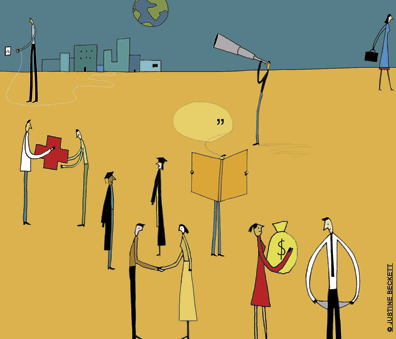
It’s not that Penn students have lacked for community-service programs in recent years.After all, more than 50 student-led organizations offer volunteer programs to choose from, a number augmented by the many academically based community-service courses and service projects run by the College Houses, the Greek system, and faith-based organizations.
What was lacking, in the opinion of History Professor Walter Licht, was a “galvanizing and sustained set of experiences,” one that would give some continuity to the students’ scholarly and service interests. He envisioned a program that would provide selected undergraduates with a four-year experience where they could “connect their civic engagement with research in civic issues and problems.”
The result is the Civic Scholars Program, a new program that gives selected undergrads a chance to “incorporate their academic interests with research and service to the community,” notes Licht, who will serve as its faculty director, complementing his current post as faculty director of Penn’s Civic House. The program will work with the admissions office to identify incoming students likely to be interested.
“This is an absolutely unique program, nationally and for Penn,” adds Licht, and one that will promote “leadership in community affairs and policy-oriented scholarship.”
The program’s first class of 15 students will begin their service this September, and will address local issues—such as urban healthcare education, poverty, and housing—from a global perspective. In addition to a non-credit pro-seminar, students will be required to take five approved courses, participate in community service for at least five semesters, work in a paid summer internship, and take on a capstone research project. They will be able to publish results of their research in a new journal and, at the end of the four years, be certified as Civic Scholars.
“My great hope is that in four years we will have 60 students who thrive together and learn from each other in their interconnected service and scholarly experiences,” says Licht. “And one day, if one or two of our Penn Civic Scholars provide extraordinary leadership and ideas in solving problems in education, health, poverty, social inequalities, housing, or racial and ethno-religious antagonisms, then we really will have succeeded.”
Penn President Amy Gutmann, noting that community service and scholarship are “too often separated,” praised the program for offering students “a great opportunity to integrate their civic-service interests with their academic experiences at Penn.” —S.H.




